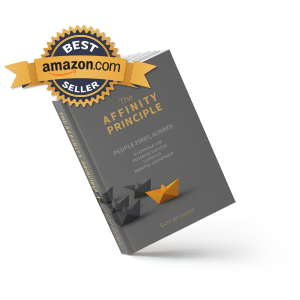Overcoming F.E.A.R. During COVID Uncertainty
 By Grant Ian Gamble | April 15, 2020
By Grant Ian Gamble | April 15, 2020
Grant Ian Gamble is a speaker, author, and business coach. He works in a broad array of industries helping companies build teams, navigate change, and drive growth.
 The acronym for F.E.A.R. is False Evidence Appearing Real.
The acronym for F.E.A.R. is False Evidence Appearing Real.
When you’re dealing with the unknown, facts are changing daily, experts are predicting very different outcomes, and the media, politicians and your own predilections are distorting the information you’re processing. This makes it really difficult to discern false evidence from real facts.
In defense of all the stakeholders in the distribution of information, no one has an incredibly clear picture of what reality is right now, and they certainly have no idea about what the outcome will be in the future.
When we’re facing a very real threat to ourselves, our families and indeed our way of life, fear can rise up pretty quickly.
On top of these very personal threats to their wellbeing, my consulting clients are faced with additional fears. Fears for their team members’ wellbeing, fear of their loss of ability to serve their customers, and fear for their businesses and livelihoods.
These are seriously stressful times!
As I’m working with my clients in these uncertain times, one of the most important roles I fulfill is to try and sift through the fear-based information and the fact-based information.
That might seem really straight forward, but often it is not.
Fear creeps in when things change. Change in and of itself creates fear.
Very often, the fear change generates is misplaced and never comes to fruition. But that’s easy to say, harder to determine and very hard to convey when people’s backs are against the wall.
Fear Paralysis
Recently, I was working through options with a senior manager for a company I am working with and I kept hearing his mind’s projections into the future where he was re-inventing and re-experiencing realities that did not and might never exist. He was telling me why we couldn’t shift to virtual training and why we had to hunker down and hope that this all goes away really quickly. And that the best we could hope for is that this would someday seem like a bad dream.
He was completely paralyzed by fear and couldn’t see his way through it. As a result, he shut down and refused to think creatively.
Wishing and hoping this crisis away is a lot like playing the lottery. You know it’s not likely (in fact it’s damn near impossible) but you hope anyway.
What we need to do in times like these is look at the unvarnished truth as we know it today:
- This thing is not going away anytime soon
- Everyone’s in the same boat
- Hunkering down and not taking affirmative action is foolish
- Assuming the worst is also a fool’s errand
- Not preparing for the worst is even more foolish
The truth is that we need to tackle this crisis on an hour by hour, day by day, and month by month basis.
We can’t project an end to the suffering, but we can plot a course that allows for a number of potential end points and work towards those with focus and determination.
As some of those endpoints pass us by and we are still in crisis mode, we need to realign our next set of projections and focus once again.
There is no predicting the likely outcome of this spiraling mass of chaos, but as with the Chaos Theory, very small changes can have far reaching impacts.

Chaos Theory
In the Chaos Theory, initial conditions are considered extremely important. If you look at the response by countries and states across the globe, you can see that where early and affirmative action was taken, outcomes improved more quickly.
This is a great lesson: early and affirmative action.
A second element of the Chaos Theory is unpredictability. One thing we know with certainty is that the ultimate outcome of this global event cannot possibly be predicted accurately. If for no other reason, the sheer magnitude of variables in a global event like this make predicting an outcome impossible.
The lesson in this is to focus on the things you can change and don’t get distracted by all the variables that are out of your control.
It is easy to get consumed by the what ifs and let the overwhelming amount of information cloud our view. Fear stalks us all in these challenging times and channeling your focus, time and energy into productive pursuits is tough.
If you’re struggling to see any light at the end of this long tunnel, I would suggest you focus on the process and not the outcome. Take action where and when you can.
And don’t get caught up in the things that remain unknown or out of your control.

Other Articles to Help You Through Uncertain Times:
-
Strategies to Follow as You Re-Open or Re-Imagine Your Business in the New COVID-19 Reality
-
How to Transcend Troubling Times
-
4 Tips to Proactively Address the Stress of COVID-19
-
5 Steps to Re-Imagine Your Business Post COVID-19
-
Change Management During Uncertain Times
-
26 Non-Negotiables, Opportunities & Tips for Surviving and Thriving During and After the COVID-19 Pandemic
-
30 Business Sectors That Are Booming During the COVID-19 Pandemic
-
Virtual Training During and Beyond COVID-19
-
Virtual Stand-Up: A Simple Communication Tool for You and Your Team During COVID
-
13 Tips to Help Your Business Survive the Coronavirus Pandemic
Let's Connect!
CUSTOMER EXPERIENCE & TEAM ENGAGEMENT: AFFINITY OS™ | WELLNESS INTEGRATION | MINDFUL LEADERSHIP: "THE AFFINITY PRINCIPLE"
0475 866 592

The Affinity Principle™ by Grant Gamble presents a formula for business success through a people-centric, mindful leadership approach.
PEOPLE FIRST, ALWAYS.

